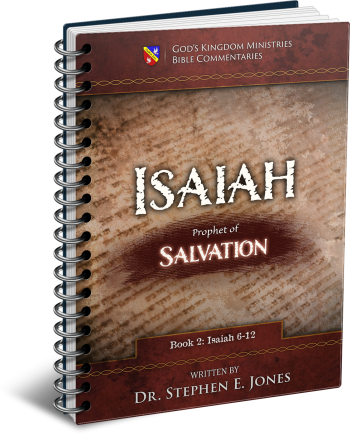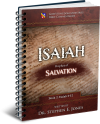Latest Posts
View the latest posts in an easy-to-read list format, with filtering options.

Isaiah is the prophet of Salvation. He is also known as the truly "Universalist" prophet, by which is meant that He makes it clear that salvation is extended equally to all nations and not just to Israel. He lived to see the fall of Israel and the deportation of the Israelites to Assyria, and he prophesied of their "return" to God (through repentance). He is truly a "major prophet" whose prophecies greatly influenced the Apostle Paul in the New Testament.
Category - Bible Commentaries

If Isaiah’s prophecies are recorded chronologically, it appears that the first five chapters were written during the early part of his ministry. Recall that Isaiah’s ministry began in the reign of King Uzziah of Judah (Isaiah 1:1). So Isaiah 6:1 says,
1 In the year of King Uzziah’s death I saw the Lord sitting on a throne, lofty and exalted, with the train of His robe filling the temple.
It appears also that as long as Uzziah reigned, Isaiah was hindered from entering into his real calling. Hence, it was only after Uzziah’s death that Isaiah had his vision of God and heard His voice from the temple calling him to his ministry (Isaiah 6:8).
There are many examples of such hindrances. David was hindered from entering his call as king until Saul died. Jesus could not fully enter His ministry until John died (John 2:4). Moses was hindered until he was 80 years of age and was sent only when those seeking his life had died (Exodus 4:19). Likewise, no high priest in Israel could enter his full calling until the previous high priest had died—even if he served as a substitute while his father was old. Everyone’s calling was established long before they actually were called to minister in a practical manner.
I, too, have seen such divine hindrances in my own ministry and have come to understand the mind of God in this. My calling was held by another before me as well, just as previous people were called before my own predecessor. God also uses this tactic to bring us into our callings in phases as well, much like David, who was made king of Judah before becoming king of Israel. These phases serve as training grounds for the next phase as we grow and learn.
Not everyone who was called was actually obedient to his calling. Saul was in rebellion and was thus replaced by David and his lineage. Yet David’s reign had to await the death of Saul.
All divine hindrances, whether implemented directly by God or through men, merely delay things to the proper time. While some may chafe at these delays, understanding the sovereignty of God gives us the patience to know that God’s timing is perfect and that there is no man or evil spirit that can prevent us from entering into our calling.
In the case of Isaiah, his call did not come until the death of Uzziah. Somehow, Uzziah’s reign delayed Isaiah’s full entry into his calling. Obviously, Isaiah had prophesied for some time during the reign of Uzziah, but only when the king was dead did God move Isaiah into the fulness of his calling.
The story of Uzziah is found in 2 Chronicles 26. He was sixteen years old when his father Amaziah died. His coronation marked a new era in the history of David’s lineage, which had been interrupted for 76 years. The four kings prior to Uzziah were blotted out from the divine registry on account of the blasphemy of Joram. It took 76 years of cleansing to restore the monarchy to its original calling. (I explained this in detail in chapter 8 of Secrets of Time.)
So the Old Testament tells us that after Joram's blasphemy, Ahaziah ruled for 1 year (2 Kings 8:26), Athaliah ruled for six years (2 Kings 11:1-3), Jehoash ruled for 40 years (2 Kings 12:1), and Amaziah ruled for 29 years (2 Kings 14:2).
This was a total of 76 years, but their names were omitted from the registry given in the first chapter of Matthew. So Matthew 1:8 says, “Joram the father of Uzziah.” The term “father” can mean any ancestor, of course, but the point is that Matthew expunges four names from the official record. This served also to list just 14 generations “from David to the deportation to Babylon” (Matt. 1:17). It is only 14 generations, because the four kings of Judah above were expunged from the record.
Joram himself was the cause of this disruption. He had walked in the ways of the kings of Israel (2 Chron. 21:6), for he had married Athaliah, the daughter of King Ahab, who in turn had married Jezebel, the princess from Sidon. 2 Chron. 24:7 says of Joram and his brothers,
7 For the sons of the wicked Athaliah had broken into the house of God, and even used the holy things of the house of the Lord for the Baals.
God was not willing to destroy the temple at that time (2 Chron. 21:7), but his sin did cause the priestly city of Libnah to revolt against him (2 Chron. 21:10). Joram’s desecration of the temple resulted in the need for a 76-year time of cleansing, because 76 is the biblical number of cleansing. Joram’s sin was thus visited upon the people to the third and fourth generation, according to the law in Exodus 20:5. It was actually three generations, but if we include Athaliah’s six-year reign, it was four monarchs total.
When the 76 years of cleansing ended, Amaziah was assassinated on schedule (2 Chron. 25:27), and his 16-year-old son, Uzziah was placed upon the throne. (2 Kings 15:1 calls him Azariah.) Uzziah’s calling was to restore and rededicate the temple that had been desecrated by his forefather, Joram. At first, he was obedient to his calling and “continued to seek God in the days of Zechariah… and as long as he sought the Lord, God prospered him” (2 Chron. 26:5).
However, 2 Chron. 26:16 says,
16 But when he became strong, his heart was so proud that he acted corruptly, and he was unfaithful to the Lord his God, for he entered the temple of the Lord to burn incense on the altar of incense.
In other words, he tried to be a king-priest when he was not called as such. The high priest and eighty priests opposed the king, but this only enraged Uzziah (2 Chron. 26:19). At that point, God inflicted the king with leprosy, and he then spent the rest of his reign in “a separate house,” that is, a house of separation (2 Chron. 26:21).
We do not know how long Uzziah lived as a leper, but 2 Kings 15:5 tells us that his son Jotham became the co-regent, essentially taking his father’s place in all practical matters. In the year that Uzziah died, Isaiah saw his vision of the temple and received his calling. More importantly, the desecration of the temple seems to have ended with the death of Uzziah, for Isaiah then saw the restored temple with God sitting upon the throne as King of the temple.
At that point, Isaiah became the prophet of the restored temple. God shifted the restoration ministry from the king to the prophet. Uzziah’s name means “Strength of Yah,” but as time passed, and as he built up his military strength, he relied upon his own strength (2 Chron. 26:15). So God called Isaiah, whose name is derived from yasha, “to save,” and is thus a type of Yeshua (“salvation”). This was meant to convey to us the greater truth that the power of flesh is inadequate and that Yeshua is the true Source of our salvation and deliverance.
Isaiah 6:1 says,
1 In the year of King Uzziah’s death I saw the Lord [Adonay, “my Lord”] sitting on a throne, lofty and exalted, with the train of His robe filling the temple.
We are meant to take notice of the contrast between the leprous king and the glorious King. Leprosy is a biblical type of mortality (slow death). But the glorious King is the immortal One, incorruptible, glorious, and the exalted Sovereign of the Universe. Here He is called Adonay, which suggests that this is Jesus Christ, rather than the Father Himself.
In Psalm 110:1, David wrote:
1 The Lord [Yahweh] says to my Lord [Adonay], “Sit at My right hand, until I make Your enemies a footstool for Your feet.”
Jesus quoted this verse in Matt. 22:42-44 to confound the Pharisees, who had asked Him “about the Christ, whose son is He?” Jesus then asked them, “Then how does David in the Spirit call Him ‘Lord’” in Psalm 110:1? Obviously, Adonay was a title of the Messiah, the Son of David who was also his “Lord.”
Hence, Isaiah was seeing the exalted Christ, to whom the world was to be subjected, as Paul tells us in 1 Cor. 15:27, 28. This also resolves the difficulty in the fact that “no man has seen God at any time” (John 1:18; 1 John 4:12). Isaiah says plainly, “I saw Adonay,” that is, Christ.